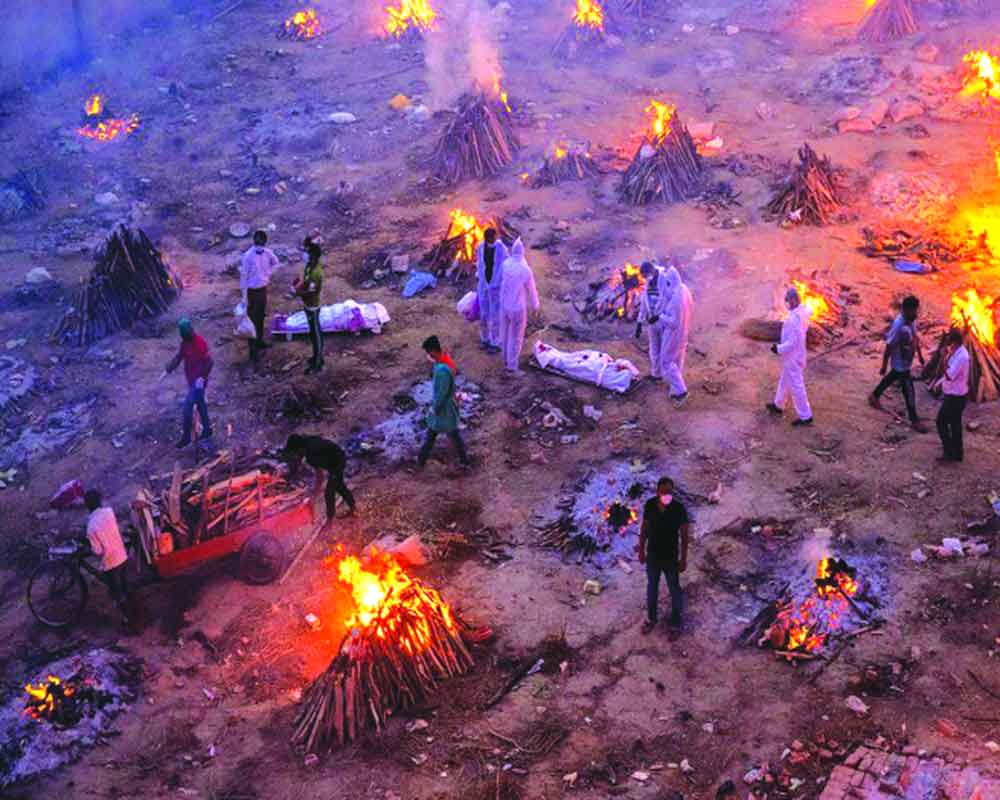The Civil Registration System accurately captures death registration data and proves COVID is not the only reason for increased death registration
The Civil Registration System (CRS) data released by the office of the Registrar General of India (RGI) shows a 6.2 per cent increase in the number of death registrations in 2020. From 76.4 lakh registered deaths in 2019, it went up to 81.2 lakh in 2020, which is consistent with the recent trend of increasing registrations of deaths in the country.
The 2018 figures showed a 7.5 per cent increase over the previous year’s death registration, and then an almost 10 per cent spike in 2019. With India making steady strides towards ‘maximum and people-friendly digitalisation’, death registration has also become easier, which reflects in the trends over the last few years. The heightened social awareness towards requirement of such certificates for bank accounts, property settlements and more has also been a factor in increased registration. Due to sensitisation conducted by RGI and Chief Registrars of the States and UTs, increased use of IT and mobile-based apps, the level of birth and death registration has increased substantially.
While the country reports a downward trend in Crude Death Rate, which is 6/1000 live births as per the SRS 2016-18, the estimates for death registrations have improved over time, which does not indicate actual increase in number of deaths. This improved trend of death registration may be attributed to several factors and mechanisms strengthening the CRS and spans detailing of work division (Microplan), digitalisation of death registration system in CRS (more than 54 per cent in 2020 and 85 per cent in 2022), and global commitment to attain Sustainable Development Goals (SDG) targets (16.9 and 17.1). One of the crucial and beneficial steps taken in CRS of India along the years is the ‘linkage of data points across the sources’ for, say, hospital admission and discharge register, hospital mortuary register, disease surveillance register, cancer register and police records, thus further enhancing the robustness.
The raised eyebrows and questions over the CRS data, largely over the number of COVID deaths, are misplaced. The arguments are essentially based on “the absence of reliable registration of COVID-19 deaths in India”. Similarly, “families often prefer to hide the nature of the ailment affecting their relatives, ascribing resulting deaths to fevers or other diseases to avoid social stigma” is based more on hearsay or clichéd perceptions.
The RGI’s annual CRS figures capture ‘all-cause mortality’. The deaths due to COVID make a subset of the overall figure. And, it is these reliable figures released by the Statutory Authority of RGI that should be utilised. As on May 3, 2022, India had recorded 4,30,85,166 COVID cases with 5,23,889 deaths with a Case Fatality Rate of 1.2 per cent. India reported its first death due to the pandemic on March 13, 2020, and reported cumulative deaths of 1,48,738 in 2020. The number nearly doubled to 3,32,342 in 2021 during the second wave.
The close tracking of COVID cases and mortality statistics on a daily basis, with the help of real-time dashboard, has also reiterated on the importance of the process, thus supporting the systems in timely intervention at a particular area or district which eventually led to containment of the disease and mitigated the catastrophic effect of the third wave. Along with the success stories of COVID-19 mitigation in India, the country’s efforts to contain the virus with active engagement of Frontline workers, uninterrupted service delivery, and vital registrations at district level should also be referred and captured.
An increase of 4.8 lakh death registration in 2020 from the previous year reaffirms the CRS’ efficiency. The COVID deaths out of total registered deaths of 81.2 lakh in 2020 are reported as 1.48 lakh. The figures of death registration provided by CRS 2020 do not need statistical measures like 95 per cent confidence interval as these are actual figures and not estimates.
Moreover, the modelling-driven estimates or studies have a great scope for fallacy owing to selective-restrictive sample datasets, analysis assumptions, overestimations and interpretations. They rely more on the assumption software as compared to vigorous data collation technique adopted by the Union Government. The RGI methodology is extremely robust, with the birth and death registration done under ‘Registration of Birth and Death Act 1969’. Under that legal framework, CRS provides for universal, continuous, compulsory and permanent recording of birth, death and still birth.
To rectify an underestimation, say reported COVID deaths in India, the mathematical models do not seem to be a suitable solution which would be providing an unclear and incorrect picture by proposing the death count very high as compared to reported by National reports. Modelling software were meant and used to identify the hotspot with attributable risk factors to support the prevention and treatment decisions by the local authority to control the event and thus save lives.
Thus, estimates obtained from modelling techniques are inappropriate to counter the actual national level statistics showing actual numbers of death registration by a robust system using multiple data points complemented with using appropriate definitions for labelling COVID deaths.
(Maj Gen (Prof) Atul Kotwal is a former director of NHSRC. The views expressed are personal.)


























